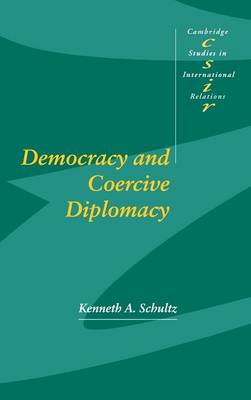In this book, first published in 2001, Kenneth Schultz explores the effects of democratic politics on the use and success of coercive diplomacy. He argues that open political competition between the government and opposition parties influences the decision to use threats in international crises, how rival states interpret those threats, and whether or not crises can be settled short of war. The relative transparency of their political processes means that, while democratic governments cannot easily conceal domestic constraints against using force, they can also credibly demonstrate resolve when their threats enjoy strong domestic support. As a result, compared to their non-democratic counterparts, democracies are more selective about making threats, but those they do make are more likely to be successful - that is, to gain a favorable outcome without resort to war. Schultz develops his argument through a series of game-theoretic models and tests the resulting hypothesis using both statistical analyses and historical case studies.
- ISBN13 9780521792271
- Publish Date 26 July 2001
- Publish Status Active
- Publish Country GB
- Imprint Cambridge University Press
- Format Hardcover
- Pages 324
- Language English
